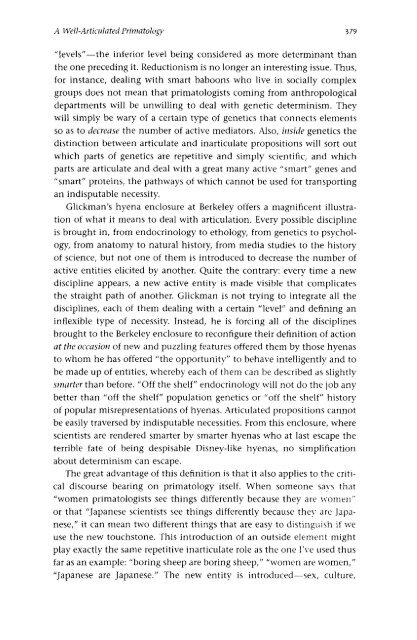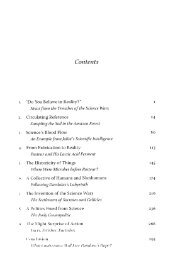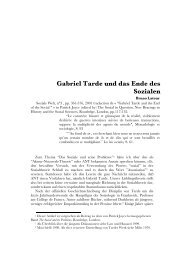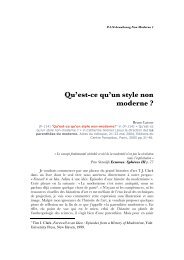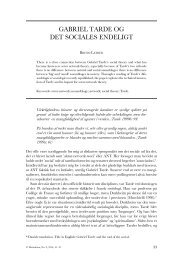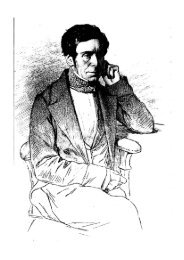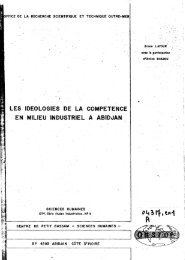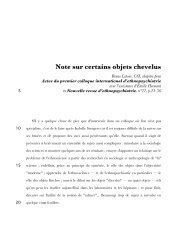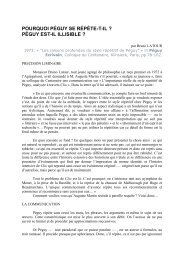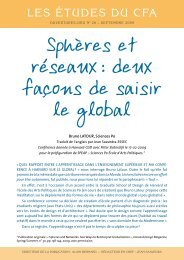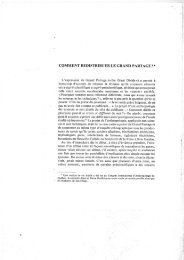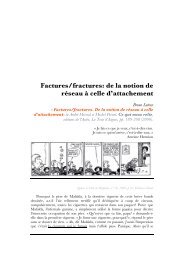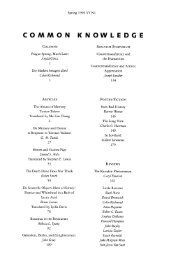A Well-Articulated Primatology - Bruno Latour
A Well-Articulated Primatology - Bruno Latour
A Well-Articulated Primatology - Bruno Latour
You also want an ePaper? Increase the reach of your titles
YUMPU automatically turns print PDFs into web optimized ePapers that Google loves.
A llell-<strong>Articulated</strong> <strong>Primatology</strong> 379<br />
"levels"-the inferior level being considered as more determinant than<br />
the one preceding it. Reductionism is no longer an interesting issue. Thus,<br />
for instance, dealing with smart baboons who live in socially complex<br />
groups does not mean that primatologists coming from anthropological<br />
departments will be unwilling to deal with genetic determinism. They<br />
will simply be wary of a certain type of genetics that connects elements<br />
so as to decrease the number of active mediators. Also, itrside genetics the<br />
distinction between articulate and inarticulate propositions will sort out<br />
which parts of genetics are repetitive and simply scientific, and which<br />
parts are articulate and deal with a great many active "smart" genes and<br />
"smart" proteins, the pathways of which cannot be used for transporting<br />
an indisputable necessity.<br />
Glickman's hyena enclosure at Berkeley offers a magnificent illustration<br />
of what it means to deal with articulation. Every possible discipline<br />
is brought in, from endocrinology to ethology, from genetics to psychology,<br />
from anatomy to natural history, from media studies to the history<br />
of science, but not one of them is introduced to decrease the number of<br />
active entities elicited by another. Quite the contrarv: every time a new<br />
discipline appears, a new active entity is made visible that complicates<br />
the straight path of another. Glickman is not trying to integrate all the<br />
disciplines, each of them dealing with a certain "level" and defining an<br />
inflexible type of necessity. Instead, he is forcing all of the disciplines<br />
brought to the Berkelev enclosure to reconfrgure their defrnition of action<br />
at the occasion of new and puzzling features offered then.r by those hyenas<br />
to whom he has offered "the opportunitr." to behave intelligently and to<br />
be made up of entities, whereby each of them can be described as slightly<br />
sntdrter than before. "Off the shelf" endocrinologv lr,'ill not do the job any<br />
better than "off the shelf" population genetics or "off the shelf" histor;'<br />
of popular misrepresentations of hyenas. <strong>Articulated</strong> propositions cannot<br />
be easily traversed by indisputable necessities. From this enclosure, where<br />
scientists are rendered smarter by smarter hyenas who at last escape the<br />
terrible fate of being despisable Disney-like hyenas, no simplification<br />
about determinism can escape.<br />
The great advantage of this definition is that it also applies to the critical<br />
discourse bearing on primatology itself. When sorneone savs that<br />
"women primatologists see things differently because they arc \\'ontell"<br />
or that "Japanese scientists see things differently because thev arc Japanese,"<br />
it can mean two different things that are easy to distinguish if rve<br />
use the new touchstone. This introduction of an outside elemer.rt might<br />
play exactl.v the same repetitive inarticulate role as the one I'r'e trsed thus<br />
far as an example: "boring sheep are boring sheep," "wonren are women,"<br />
"Japanese are Japanese." The new entity is introduced-sex, culture,


